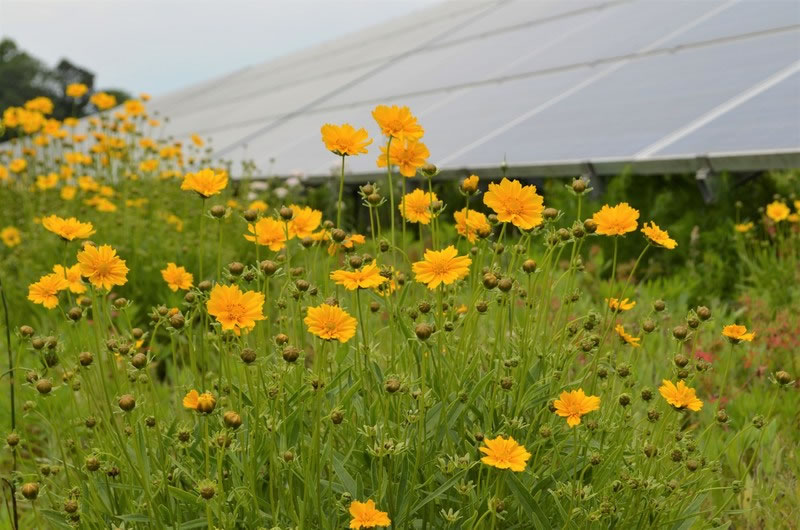Perdue Farms Becomes the First Poultry Company in the United States To Create a Pollinator-Friendly Habitat Throughout its Solar Installation

The U.N. Food and Agriculture Organization estimates that 75% of food crops rely at least partially on pollination*. According to the United States Department of Agriculture, the pollinator population in the United States has suffered tremendous losses, including the honey bees which American farmers rely on to pollinate crops.** Additionally, as part of the Department of Energy's InSPIRE research project, Argonne National Laboratory found that the area around solar panels could provide an ideal location for the plants that are beneficial to pollinators.*** Recognizing the unique leadership role it can play in this area, Perdue Farms announces it has become the first poultry company in the United States to have pollinator-friendly ground cover at a company solar installation. It is located at the company's headquarters in Salisbury, Maryland. The announcement coincides with World Environment Day on June 5, which celebrates biodiversity this year.
"Given Perdue Farms' long-standing commitment to being good stewards, having the area at our 5-acre solar field at our headquarters become a pollinator-friendly habitat was a no-brainer for us," said Steve Levitsky, vice president of sustainability for Perdue Farms. "There is a growing body of research that shows pollinator habitat can help increase yields of a variety of fruits and vegetables, including soybeans - one of the key components of a chicken's diet - so we wanted to do something that has the potential to benefit the environment as well as the farmers near our headquarters. Additionally, the land directly under solar panels has traditionally been filled with gravel or grass, and the cost to create and maintain a pollinator habitat is roughly the same, so there's no financial barrier to incorporating pollinator-friendly ground cover into the facility. Because of these benefits, we are planning to require pollinator-friendly ground cover at future company solar projects in order to provide even more benefits to the communities in which they are located. Asking for pollinator-friendly solar is a great way for electric utilities and corporations to ensure the solar energy they are buying does not result in negative tradeoffs."
A pollinator-friendly ground cover consists of a variety of flowering plants that provide food in the form of nectar and pollen in each growing season. It contains a mixture of plants that bloom from early spring to late fall so that flowers will be available when pollinators are active. The species were selected to be low-growing to keep from shading the panels, as well as deep-rooted to be resilient to periods of intense sun and rain.
To be a pollinator-friendly solar project in the state of Maryland, a facility must meet or exceed the minimum score set forth in the Solar Site Pollinator Habitat Planning and Assessment scorecard. The assessment includes the percentage of the site with flowering plants, the utilization of native plants, the number of different plants used, and the incorporation of blooming species through different seasons and more. Perdue Farms greatly exceeded the requirements for producing an "exceptional habitat."
The company partnered with Fresh Energy, a catalyzer of pollinator-friendly solar, and the Bee and Butterfly Habitat Fund, whose mission is to increase and improve pollinator forage and habitat via their NextGen Habitat Project pollinator-focused seed mixes. The mixes support some of the highest abundance and diversity of plants preferred by monarchs and native bees as well as managed honey bees and other pollinators. The Perdue Farms habitat consists of 41 different types of flowers and grasses including Black Eyed Susan, Alsike Clover, Sawtooth Sunflower, Narrow-Leaf Milkweed, Purple Coneflower and more. Jim Passwaters, environmental vegetative buffers coordinator for Delmarva Poultry Industry, prepared the site and planted the seeds. In total, more than 250,000 native and pollinator-friendly plants are growing on the solar array adjacent to Perdue Farms' headquarters.
2020 is the first year the habitat has been in bloom. Planting took place in 2018, and it took two years for the seeds to take root and bloom.
In 2017, Perdue Farms was part of a coalition of agriculture, conservation, and energy organizations that advocated for SB 1158, a bipartisan bill to establish a state-wide standard for pollinator-friendly solar in Maryland. The bill passed with unanimous support of the Maryland state legislature and was signed into law by Governor Larry Hogan during a ceremonial signing at the Annapolis Harbor. This process led to Perdue Farms' decision to replace the turfgrass at its solar facility with pollinator-friendly ground cover.
"Maryland embraces clean and renewable energy, especially solar energy that is compatible with productive uses of the land under and around the panels. Pollinator-friendly habitat as ground cover is a wonderful way to bring people and communities together, benefit agriculture and ecosystems, and help our state meet ambitious environmental and climate goals," said Ben Grumbles, secretary of the environment for the state of Maryland.
About Fresh Energy & Pollinator-Friendly Solar
Best practices and resources for pollinator-friendly solar development are available from the Center for Pollinators in Energy nonprofit, a program of Fresh Energy, www.BeesLoveSolar.org
About Perdue Farms
We're a fourth-generation, family owned, U.S. food and agriculture company in our 100thyear of business. Through our belief in responsible food and agriculture, we are empowering consumers, customers and farmers through trusted choices in products and services.
The PERDUE® brand is the number-one brand of fresh chicken in the U.S., and the company is the leader in organic chicken in the U.S., and Perdue AgriBusiness is an international agricultural products and services company. Now in our centennial year, our path forward is about getting better, not just bigger. We never use drugs for growth promotion in raising poultry and livestock, and we are actively advancing our animal welfare programs. Our brands are leaders in no-antibiotics-ever chicken, turkey and pork, and in USDA-certified organic chicken. Learn more at corporate.perduefarms.com.
Comments (0)
This post does not have any comments. Be the first to leave a comment below.
Featured Product


